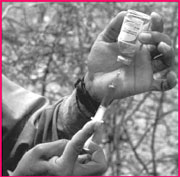 Summary
Summary
The WTO has amended the rules on intellectual property rights to
recognise that the rights of countries to address public health
concerns should come before those of patent holders. Unfortunately,
recognition and implementation remain very far apart. A variety of
reasons, including technicalities, lack of capacity, charity and armtwisting,
mean that in practice patent holders often win out. The
rights of poor countries to protect their health systems will be further
curtailed after January 2005.
This paper provides an analysis of the prospects that poor countries
face in exercising their rights to address public health concerns,
raises questions on whether charity should be a substitute for rights,
looks at how the access to medicines agenda has been narrowly
interpreted, and examines the implications of this for poor people in
developing countries. Recommendations are made that access to
HIV/AIDS medicines be made available in the spirit of the WTO
provisions, rather than in a manner that robs poor countries of the
opportunity to access the medicines they need.
|






